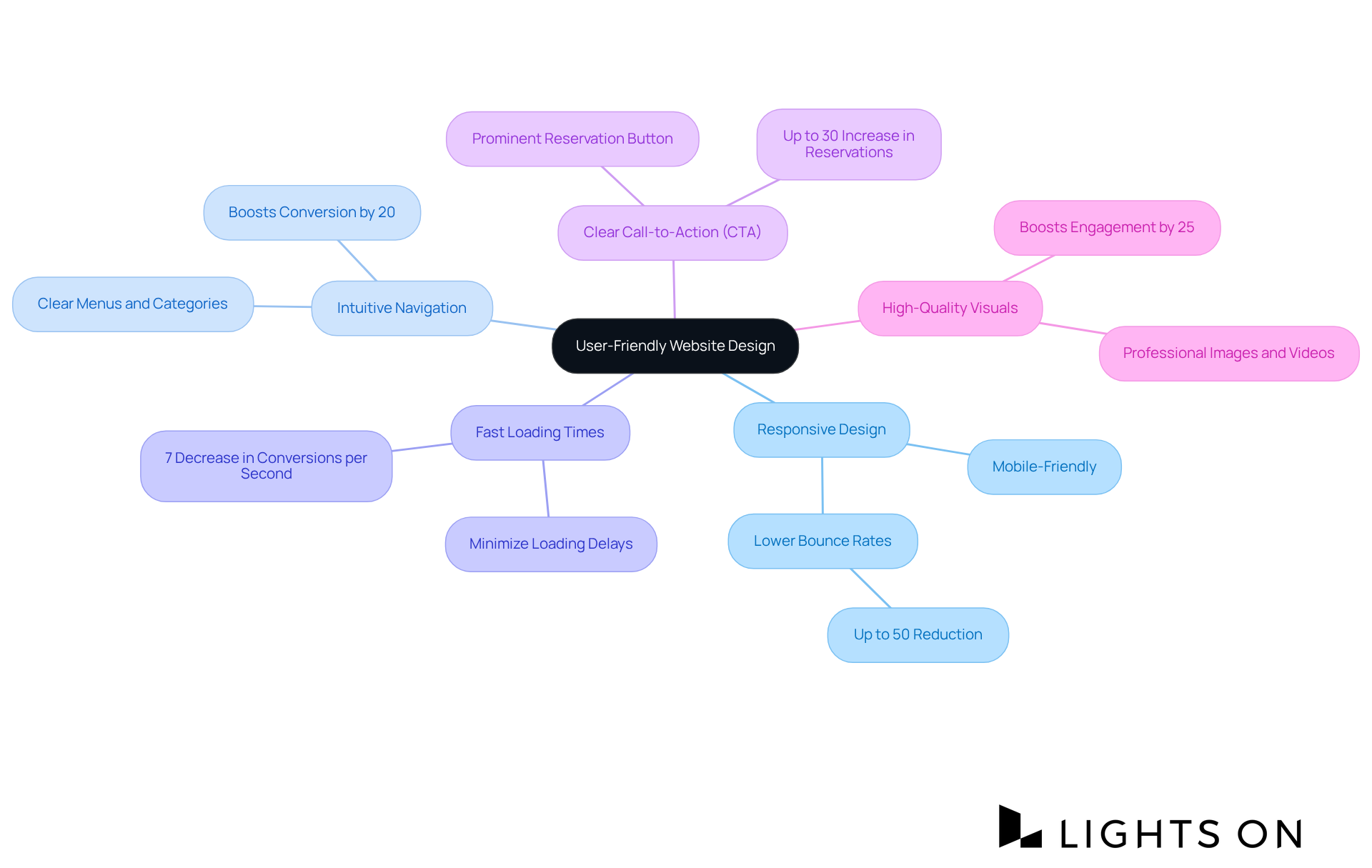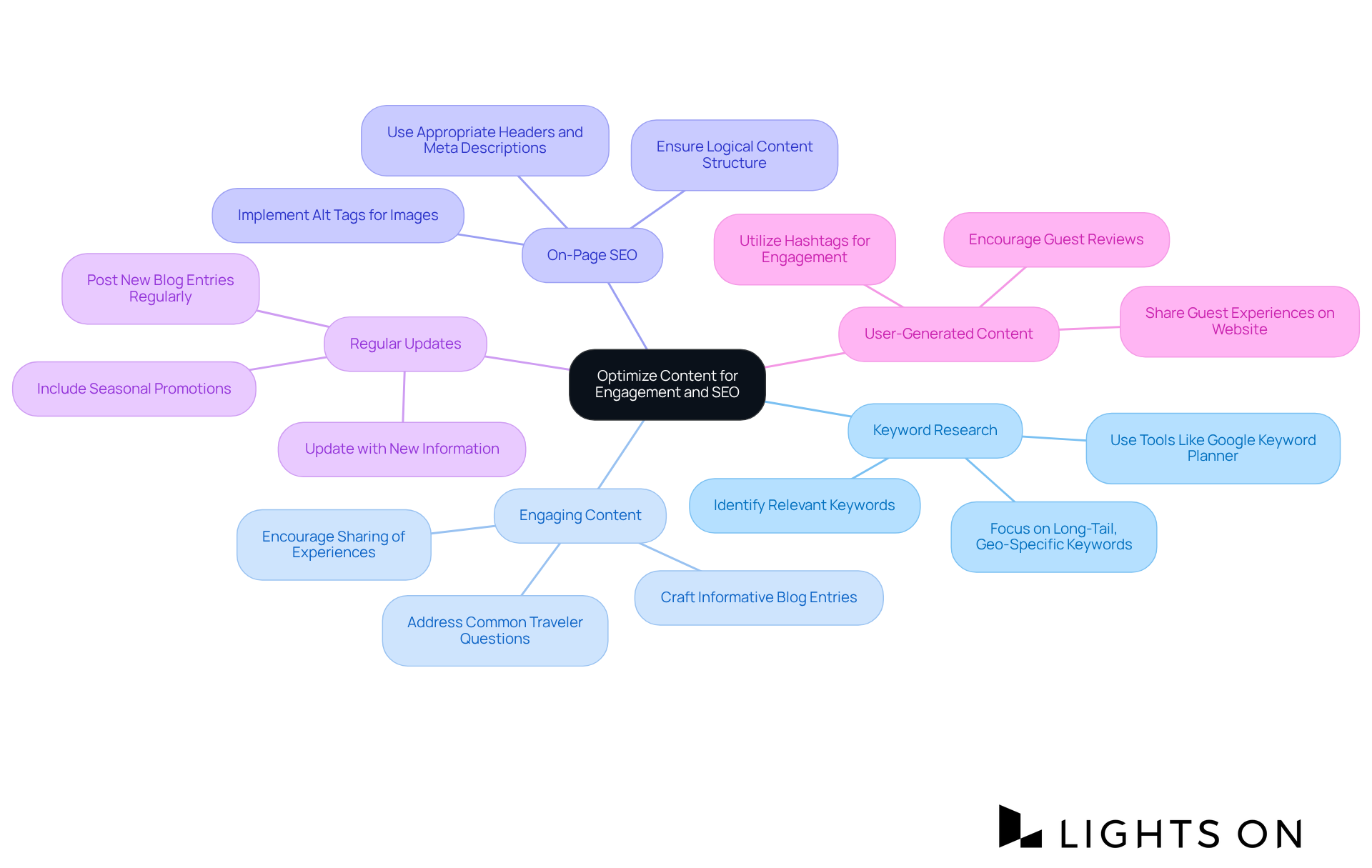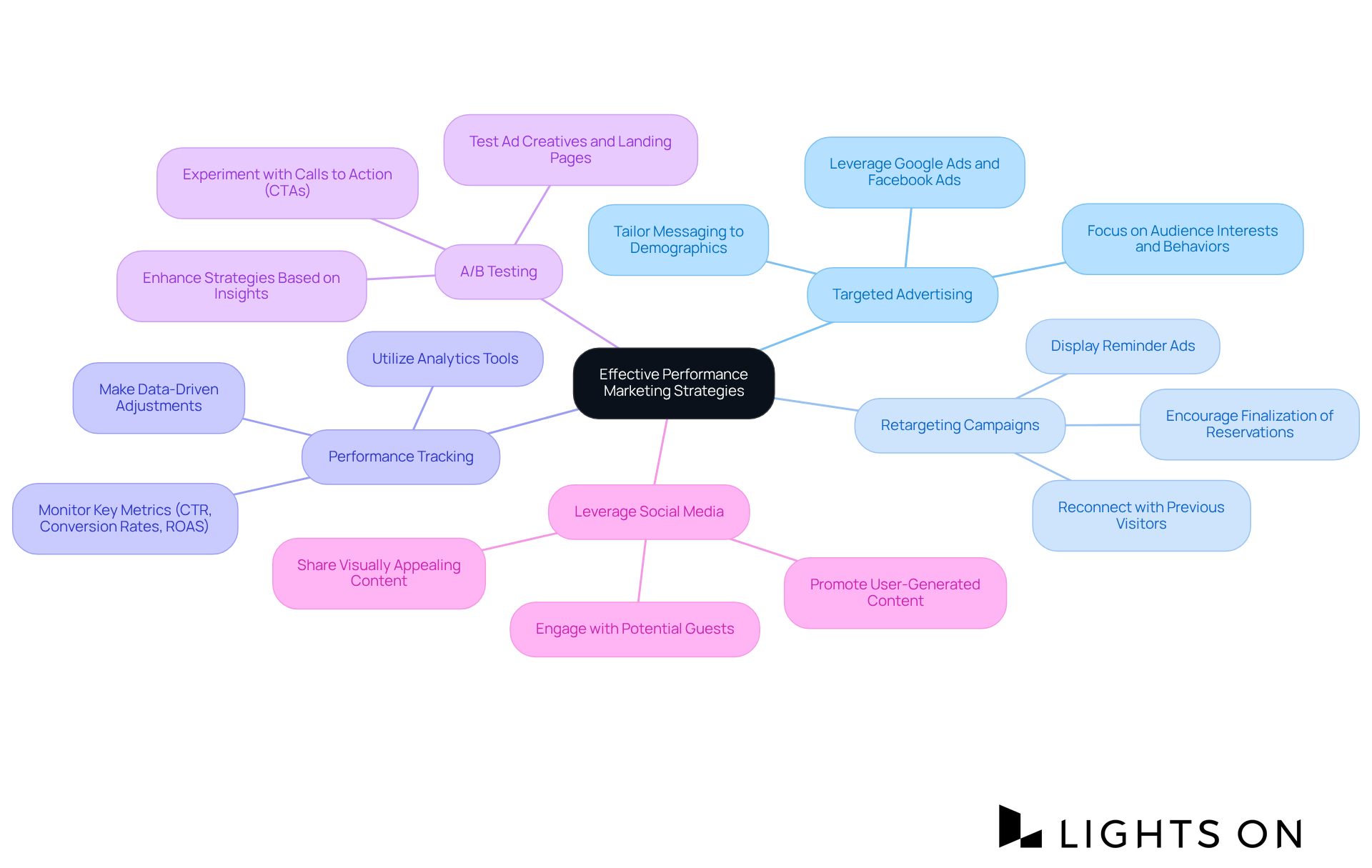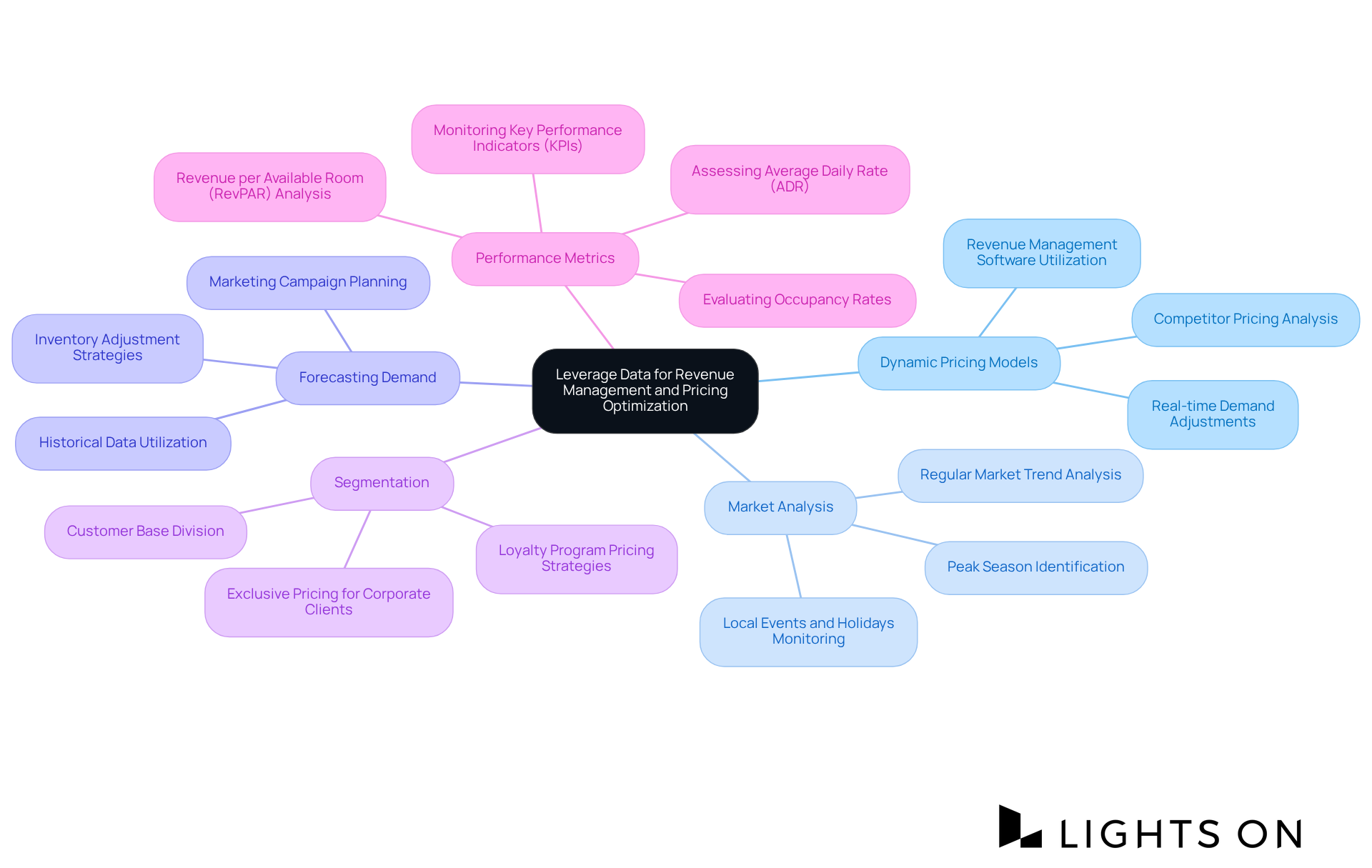Overview
To achieve hospitality success, optimizing websites is essential. Best practices encompass:
- Creating a user-friendly design
- Optimizing content for engagement and SEO
- Implementing effective performance marketing strategies
- Leveraging data for revenue management and pricing optimization
Specific strategies such as:
- Responsive design
- Intuitive navigation
- Targeted advertising
- Dynamic pricing models
are crucial. These elements enhance user experience, increase visibility, and ultimately drive reservations and revenue in the competitive hospitality industry.
Introduction
In today's hospitality industry, the digital landscape is more competitive than ever. Potential guests now expect seamless online experiences that mirror the exceptional quality of service they anticipate receiving. Therefore, optimizing a hotel’s website transcends mere technical necessity; it is a strategic imperative that can significantly enhance visibility, engagement, and ultimately, bookings.
With numerous factors to consider—from user-friendly design to effective content and performance marketing—how can hotels not only keep pace but truly stand out?
This article delves into best practices for optimizing hospitality websites, providing insights that have the potential to transform an online presence into a formidable tool for success.
Establish a User-Friendly Website Design
To create a user-friendly that aligns with , focus on the following elements:
- Responsive Design: In today's mobile-dominated landscape, ensuring your website is mobile-friendly is crucial. A responsive design allows to adapt seamlessly to various screen sizes, enhancing accessibility for users accessing your site via smartphones and tablets. This adaptability not only enhances user experience on websites for hospitality but also positively affects . Studies show that optimizing websites for hospitality for mobile use can significantly lower bounce percentages by up to 50%, resulting in greater customer satisfaction and ultimately increasing your hotel's income.
- Intuitive Navigation: Organize your website with . Descriptive labels for navigation links help users find information quickly, reducing frustration and encouraging exploration of your offerings. As Claire Logan states, 'Is the navigation of your websites for hospitality causing you to lose revenue?' This underscores the essential function of efficient navigation in websites for hospitality, which is crucial for retaining potential clients and improving overall reservation performance. Studies indicate that enhanced navigation on websites for hospitality can boost conversion figures by 20%.
- : Optimize images and scripts to minimize loading times. Research indicates that even a delay of a few seconds on websites for hospitality can lead to higher bounce rates, which directly impacts your reservation potential. Prioritizing speed on websites for hospitality ensures that visitors remain engaged and are more likely to complete their reservations. Arooba Abbasi highlights that 'Good looks only take you so far in web design,' stressing the significance of performance alongside aesthetics in websites for hospitality to effectively generate reservations. Studies reveal that a 1-second delay in page load time can decrease conversions by 7% on websites for hospitality.
- : Make your reservation button prominent and easy to find. Utilizing contrasting colors and on websites for hospitality can significantly increase conversion rates by guiding users toward desired actions, such as making a reservation or signing up for newsletters. Case studies indicate that effective CTAs on websites for hospitality can lead to a significant boost in conversions, with some establishments reporting up to a 30% increase in reservations after enhancing these CTAs.
- : Incorporate professional images and videos that effectively showcase your property. High-quality visuals on websites for hospitality not only boost user engagement but also convey the atmosphere and unique characteristics of your establishment, enticing visitors to reserve their stay. Furthermore, providing clear contact details on websites for hospitality enhances visitor trust and lends credibility to your site, motivating users to inquire for further information and ultimately boosting reservations by as much as 25%.
By applying these strategies, establishments can significantly improve user experience on websites for hospitality, resulting in heightened bookings and overall customer satisfaction—crucial elements for effective revenue management.

Optimize Content for Engagement and SEO
To optimize content effectively, it is essential to consider several key practices:
- : Identifying relevant keywords is crucial for attracting potential guests. Utilize tools like Google Keyword Planner to discover terms with and low competition. can drive more qualified traffic, enhancing visibility in search results.
- : Craft informative and engaging content that addresses common traveler questions and concerns. This could encompass blog entries regarding local attractions, travel advice, or distinctive experiences provided by your accommodation. Engaging content not only captivates visitors but also encourages them to share their experiences, significantly boosting organic reach.
- : Implement on-page SEO techniques by using appropriate headers, meta descriptions, and alt tags for images. Ensure that your content is logically structured and includes internal links to other relevant pages. Robust on-page SEO can result in , facilitating easier discovery for potential guests.
- : Keep your content fresh by regularly updating it with new information, seasonal promotions, or blog posts. This practice aids in SEO and encourages repeat visits from users, as they are more likely to return for updated information.
- : Encourage guests to leave reviews and share their experiences on your website. User-generated content builds trust and adds fresh material that can enhance SEO. In fact, 66% of U.S. consumers trusted online reviews more than any other information source when making purchasing decisions in 2022.
By concentrating on these approaches, hotels can greatly improve their online visibility through and connect with prospective guests more efficiently, ultimately leading to increased reservations and income.

To implement , consider the following approaches:
- : Leverage platforms like Google Ads and Facebook Ads to craft targeted campaigns that focus on specific demographics. Tailor your messaging to align with the interests and behaviors of your audience, ensuring relevance and engagement. This targeted approach not only captures attention but also builds interest in your offerings.
- Retargeting Campaigns: Employ to re-establish contact with individuals who have previously accessed your website but did not complete a reservation. Display ads that remind them of your offerings, encouraging them to return and finalize their reservations. This strategy generates desire by keeping your brand top-of-mind.
- : Utilize analytics tools to monitor the performance of your marketing campaigns. Key metrics such as click-through rates (CTR), conversion rates, and return on ad spend (ROAS) are essential for evaluating the effectiveness of your approaches and making data-driven adjustments. This analysis allows for informed decision-making and prompts action to optimize performance.
- : Conduct A/B tests on various elements, including ad creatives, landing pages, and calls to action (CTAs). This experimentation aids in recognizing what appeals most to your audience, enabling you to enhance your marketing strategies based on actual insights. The iterative nature of testing fosters continuous improvement.
- Leverage Social Media: Engage potential guests on by sharing visually appealing content, promotions, and user-generated content. Social media advertising can significantly expand your reach, connecting you with a broader audience eager to explore your offerings. This engagement not only attracts attention but also fosters a connection with your brand.
By implementing these performance marketing techniques, accommodations can effectively attract visitors to their websites for hospitality and increase direct reservations. Ultimately, these strategies in a competitive environment, demonstrating the power of informed marketing decisions.

Leverage Data for Revenue Management and Pricing Optimization
To effectively leverage data for and , hotels should focus on the following strategies:
- Dynamic Pricing Models: Implement that adjust room prices based on real-time demand, competitor pricing, and . Utilizing can automate this process, ensuring timely adjustments that reflect current market conditions.
- Market Analysis: Conduct and competitor pricing to uncover opportunities for rate adjustments. Staying informed about local events, holidays, and peak seasons is crucial, as these factors significantly influence demand.
- Forecasting Demand: Leverage . This insight aids in planning marketing campaigns and adjusting inventory, ensuring that hotels are prepared for fluctuations in occupancy.
- Segmentation: Divide your approaches for various groups. For example, providing exclusive prices for corporate clients or loyalty program participants can improve customer satisfaction and boost bookings.
- Performance Metrics: Monitor (KPIs) such as occupancy rates, average daily rate (ADR), and revenue per available room (RevPAR) to evaluate the effectiveness of your pricing strategies. Recent data indicates that establishments utilizing advanced revenue management strategies have experienced notable increases in RevPAR, with forecasts suggesting a growth of 3-5% by 2025.
By effectively leveraging data for revenue management and pricing optimization, hotels can significantly and maintain a competitive edge in the evolving hospitality landscape.

Conclusion
Creating a successful online presence for hospitality businesses hinges on the effective optimization of their websites. By prioritizing user-friendly design, engaging content, and data-driven marketing strategies, hotels can significantly enhance their visibility and increase direct bookings. A well-optimized website not only improves user experience but also drives revenue growth and customer satisfaction.
Key strategies include:
- Establishing a responsive design for mobile users
- Ensuring intuitive navigation
- Optimizing loading times to keep potential guests engaged
Furthermore, implementing effective performance marketing techniques, such as targeted advertising and retargeting campaigns, can help capture and convert interested visitors. Leveraging data for revenue management and pricing optimization empowers hotels to adapt to market demands and maximize their financial outcomes.
In a competitive hospitality landscape, the significance of website optimization cannot be overstated. By embracing these best practices, hotels can create a compelling online experience that attracts and retains guests. The call to action is clear: invest in the optimization of hospitality websites to stay ahead of competitors and foster lasting relationships with guests, ultimately leading to sustained success in the industry.
Frequently Asked Questions
What is responsive design and why is it important for hotel websites?
Responsive design allows hotel websites to adapt to various screen sizes, making them mobile-friendly. This is crucial as it enhances accessibility for users on smartphones and tablets, which can significantly lower bounce rates and increase customer satisfaction and reservations.
How can intuitive navigation improve a hotel website?
Intuitive navigation organizes the website with clear menus and descriptive labels, helping users find information quickly. This reduces frustration and encourages exploration, which can boost conversion rates by up to 20%.
Why are fast loading times essential for hotel websites?
Fast loading times are crucial because even a slight delay can lead to higher bounce rates, negatively impacting reservation potential. Optimizing images and scripts ensures visitors remain engaged, with studies showing that a 1-second delay can decrease conversions by 7%.
What is a clear call-to-action (CTA) and how does it affect reservations?
A clear call-to-action (CTA) is a prominent button that guides users toward making reservations or signing up for newsletters. Effective CTAs, when strategically placed and visually distinct, can lead to significant increases in conversion rates, with some hotels reporting up to a 30% increase in reservations.
How do high-quality visuals contribute to a hotel website's effectiveness?
High-quality visuals, such as professional images and videos, effectively showcase the property, enhancing user engagement and conveying the atmosphere of the establishment. This can entice visitors to make reservations and increase trust through clear contact details, potentially boosting reservations by up to 25%.
What overall impact do these website design strategies have on hotel marketing?
Implementing these strategies can significantly improve user experience on hotel websites, leading to increased bookings and overall customer satisfaction, which are essential for effective revenue management.



